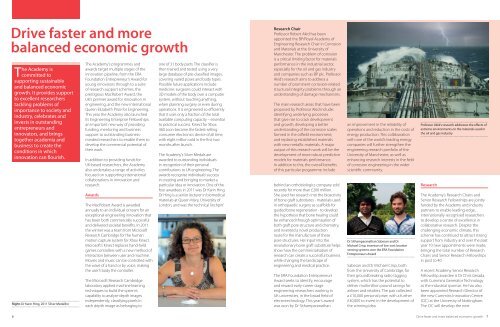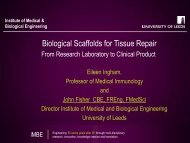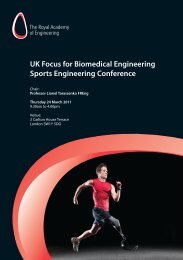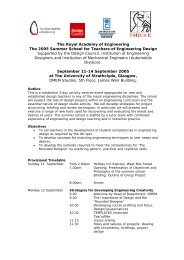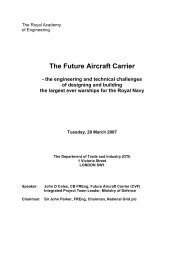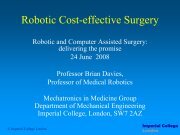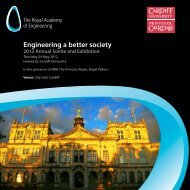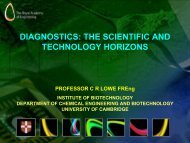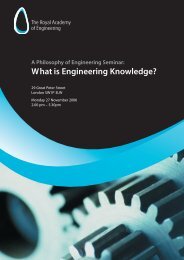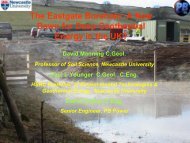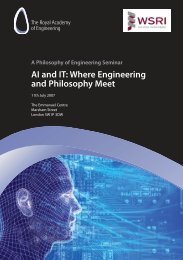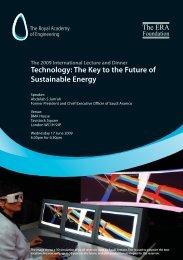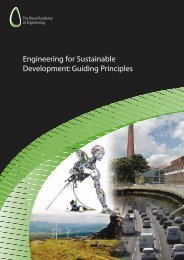RAE Annual review - Cover - Royal Academy of Engineering
RAE Annual review - Cover - Royal Academy of Engineering
RAE Annual review - Cover - Royal Academy of Engineering
Create successful ePaper yourself
Turn your PDF publications into a flip-book with our unique Google optimized e-Paper software.
Drive faster and more<br />
balanced economic growth<br />
The <strong>Academy</strong> is<br />
committed to<br />
supporting sustainable<br />
and balanced economic<br />
growth. It provides support<br />
to excellent researchers<br />
tackling problems <strong>of</strong><br />
importance to society and<br />
industry, celebrates and<br />
invests in outstanding<br />
entrepreneurs and<br />
innovators, and brings<br />
together academia and<br />
business to create the<br />
conditions in which<br />
innovation can flourish.<br />
Right: Dr Karin Hing, 2011 Silver Medallist<br />
The <strong>Academy</strong>’s programmes and<br />
awards target multiple stages <strong>of</strong> the<br />
innovation pipeline, from the ERA<br />
Foundation Entrepreneur’s Award for<br />
young innovators through to a suite<br />
<strong>of</strong> research support schemes, the<br />
prestigious MacRobert Award, the<br />
UK’s premier award for innovation in<br />
engineering, and the new international<br />
Queen Elizabeth Prize for <strong>Engineering</strong>.<br />
This year the <strong>Academy</strong> also launched<br />
its <strong>Engineering</strong> Enterprise Fellowships:<br />
an important new way <strong>of</strong> providing<br />
funding, mentoring and business<br />
support to outstanding businessminded<br />
researchers to enable them to<br />
develop the commercial potential <strong>of</strong><br />
their work.<br />
In addition to providing funds for<br />
UK-based researchers, the <strong>Academy</strong><br />
also undertakes a range <strong>of</strong> activities<br />
focused on supporting international<br />
collaborations in innovation and<br />
research.<br />
Awards<br />
The MacRobert Award is awarded<br />
annually to an individual or team for an<br />
exceptional engineering innovation that<br />
has been both commercially successful<br />
and delivered societal benefits. In 2011<br />
the winner was a team from Micros<strong>of</strong>t<br />
Research Cambridge for the human<br />
motion capture system for Xbox Kinect.<br />
Micros<strong>of</strong>t’s Kinect replaces hand-held<br />
games controllers with a new method <strong>of</strong><br />
interaction between user and machine.<br />
Movies and music can be controlled with<br />
the wave <strong>of</strong> a hand or by voice, making<br />
the user’s body the controller.<br />
The Micros<strong>of</strong>t Research Cambridge<br />
laboratory applied machine learning<br />
techniques to build the system’s<br />
capability to analyse depth images<br />
independently, classifying pixels in<br />
each depth image as belonging to<br />
one <strong>of</strong> 31 body parts. The classifier is<br />
then trained and tested using a very<br />
large database <strong>of</strong> pre-classified images,<br />
covering varied poses and body types.<br />
Possible future applications include<br />
medicine: surgeons could interact with<br />
3D models <strong>of</strong> the body over a computer<br />
system, without touching anything,<br />
when planning surgery or even during<br />
operations. It is engineered so efficiently<br />
that it uses only a fraction <strong>of</strong> the total<br />
available computing capacity – essential<br />
to practical success. Kinect for Xbox<br />
360 soon became the fastest-selling<br />
consumer electronics device <strong>of</strong> all time,<br />
with eight million sold in the first two<br />
months after launch.<br />
The <strong>Academy</strong>’s Silver Medals are<br />
awarded to outstanding individuals<br />
in recognition <strong>of</strong> their personal<br />
contributions to UK engineering. The<br />
awards recognise individuals’ success<br />
in creating and bringing to market a<br />
particular idea or innovation. One <strong>of</strong> the<br />
four awardees in 2011 was Dr Karin Hing.<br />
Dr Hing is a senior lecturer in biomedical<br />
materials at Queen Mary, University <strong>of</strong><br />
London, and was the ‘technical linchpin’<br />
Research Chair<br />
Pr<strong>of</strong>essor Robert Akid has been<br />
appointed the BP/<strong>Royal</strong> <strong>Academy</strong> <strong>of</strong><br />
<strong>Engineering</strong> Research Chair in Corrosion<br />
and Materials at the University <strong>of</strong><br />
Manchester. The problem <strong>of</strong> corrosion<br />
is a critical limiting factor for materials<br />
performance in the industrial sector,<br />
especially for the oil and gas industry<br />
and companies such as BP plc. Pr<strong>of</strong>essor<br />
Akid’s research aims to address a<br />
number <strong>of</strong> prominent corrosion-related<br />
structural integrity problems through an<br />
understanding <strong>of</strong> damage mechanisms.<br />
The main research areas that have been<br />
proposed by Pr<strong>of</strong>essor Akid include:<br />
identifying underlying processes<br />
that give rise to crack development<br />
and growth; developing a better<br />
understanding <strong>of</strong> the corrosion scales<br />
formed in the oilfield environment;<br />
and replacing established materials<br />
with new metallic materials. A major<br />
output <strong>of</strong> this research work will be the<br />
development <strong>of</strong> more robust predictive<br />
models for materials performance.<br />
In addition to this, the overall benefits<br />
<strong>of</strong> this particular programme include<br />
behind an orthobiologics company sold<br />
recently for more than £200 million.<br />
She used her research into the bioactivity<br />
<strong>of</strong> bone graft substitutes - materials used<br />
in orthopaedic surgery as scaffolds for<br />
guided bone regeneration - to develop<br />
the hypothesis that bone healing could<br />
be enhanced through optimisation <strong>of</strong><br />
both graft pore structure and chemistry,<br />
and invented a novel production<br />
route for the manufacture <strong>of</strong> these<br />
pore structures. Her input into the<br />
revolutionary bone graft substitute helps<br />
show how the commercialisation <strong>of</strong><br />
research can create a successful business<br />
while changing the landscape <strong>of</strong><br />
engineering and medical practice.<br />
The ERA Foundation Entrepreneurs<br />
Award seeks to identify, encourage<br />
and reward early-career stage<br />
engineering researchers working in<br />
UK universities, in the broad field <strong>of</strong><br />
electrotechnology. This year’s award<br />
was won by Dr Sithamparanathan<br />
an improvement in the reliability <strong>of</strong><br />
operations and reduction in the costs <strong>of</strong><br />
energy production. This collaboration<br />
with one <strong>of</strong> the world’s leading energy<br />
companies will further strengthen the<br />
engineering research portfolio <strong>of</strong> the<br />
University <strong>of</strong> Manchester, as well as<br />
enhancing research interests in the field<br />
<strong>of</strong> corrosion engineering in the wider<br />
scientific community.<br />
Dr Sithamparanathan Sabesan and Dr<br />
Michael Crisp, inventors <strong>of</strong> low-cost location<br />
sensing systems won the ERA Foundation<br />
Entrepreneurs Award<br />
Sabesan and Dr Michael Crisp, both<br />
from the University <strong>of</strong> Cambridge, for<br />
their groundbreaking radio tagging<br />
system, which has the potential to<br />
deliver multimillion pound savings for<br />
airlines and retailers. The pair collected<br />
a £10,000 personal prize, with a further<br />
£30,000 to invest in the development <strong>of</strong><br />
the winning idea.<br />
Pr<strong>of</strong>essor Akid’s research addresses the effects <strong>of</strong><br />
extreme environments on the materials used in<br />
the oil and gas industry<br />
Research<br />
The <strong>Academy</strong>’s Research Chairs and<br />
Senior Research Fellowships are jointly<br />
funded by the <strong>Academy</strong> and industry<br />
partners to enable leading-edge,<br />
internationally recognised researchers<br />
to develop a centre <strong>of</strong> excellence in<br />
collaborative research. Despite the<br />
challenging economic climate, this<br />
scheme has continued to attract strong<br />
support from industry and over the past<br />
year 10 new appointments were made,<br />
bringing the total number <strong>of</strong> Research<br />
Chairs and Senior Research Fellowships<br />
in post to 40.<br />
A recent <strong>Academy</strong> Senior Research<br />
Fellowship awardee is Dr Chris Gerada,<br />
with Cummins Generator Technology<br />
as the industrial sponsor. He has also<br />
been appointed Research Director <strong>of</strong><br />
the new Cummins Innovation Centre<br />
(CIC) at the University <strong>of</strong> Nottingham.<br />
The CIC will develop the next<br />
6<br />
Drive faster and more balanced economic growth 7


